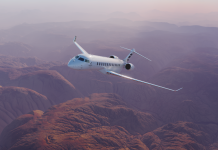
 ABL Aviation completes 15-aircraft mandate with Air France: ABL Aviation has completed the delivery of the 15th and final Airbus A220-300 aircraft (MSN 55393) to Air France, marking the successful completion of a long-term, 15-aircraft mandate between the two companies. Powered by two Pratt & Whitney PW1521G-3 engines, the Airbus A220-300 supports Air France’s ongoing fleet renewal strategy by offering greater fuel efficiency, lower carbon emissions, and enhanced operational performance. Its flexible range capabilities and quieter, more comfortable cabin further improve the passenger experience on the airline’s short and medium-haul network. “This final delivery is a proud milestone for ABL Aviation,” said Ali Ben Lmadani, Founder and CEO of ABL Aviation. “From the first aircraft to the fifteenth, our partnership with Air France has shown what can be achieved through alignment, discipline, and shared vision. We are grateful for Air France’s continued trust and proud to have supported their fleet modernisation strategy with one of the world’s most efficient narrow-body aircraft.”
ABL Aviation completes 15-aircraft mandate with Air France: ABL Aviation has completed the delivery of the 15th and final Airbus A220-300 aircraft (MSN 55393) to Air France, marking the successful completion of a long-term, 15-aircraft mandate between the two companies. Powered by two Pratt & Whitney PW1521G-3 engines, the Airbus A220-300 supports Air France’s ongoing fleet renewal strategy by offering greater fuel efficiency, lower carbon emissions, and enhanced operational performance. Its flexible range capabilities and quieter, more comfortable cabin further improve the passenger experience on the airline’s short and medium-haul network. “This final delivery is a proud milestone for ABL Aviation,” said Ali Ben Lmadani, Founder and CEO of ABL Aviation. “From the first aircraft to the fifteenth, our partnership with Air France has shown what can be achieved through alignment, discipline, and shared vision. We are grateful for Air France’s continued trust and proud to have supported their fleet modernisation strategy with one of the world’s most efficient narrow-body aircraft.”
 AMAC Aerospace Turkey signs deal with SunExpress: AMAC Aerospace Turkey announced the signing of a new four-year contract with SunExpress, a joint venture of Turkish Airlines and Lufthansa, starting this winter season. During the 2024-2025 season, AMAC Aerospace Turkey successfully fulfilled its previous contract with SunExpress, covering 7x B737 aircraft. A new four-year agreement has now been signed, extending the partnership through 2029. For the 2025–2026 season, 7x B737-800 aircraft have been confirmed. This agreement marks another milestone in the collaboration between SunExpress and AMAC Aerospace, laying the groundwork for even closer cooperation and continued growth. The Istanbul facility, located at Atatürk International Airport, Turkey, provides MRO services on Pilatus PC-12, PC-24 and Dassault products. Equipped with all necessary tooling, this facility was created by AMAC Aerospace to service the Pilatus aircraft product on exclusive basis in the Middle East region and then was developed to cover the Dassault aircraft in the region. The Bodrum facility, located at Bodrum-Milas Airport, Turkey, is the only MRO at this location. The hangar is strategically positioned directly next to the main taxiway and offers services for both line and base maintenance. Equipped with the latest and most technological hardware and construction, AMAC are the first to use a mixed business model for this hangar facility. During the winter months, the hangar carries out commercial line and base maintenance and during the summer months, the MRO flip over to VIP business maintenance.
AMAC Aerospace Turkey signs deal with SunExpress: AMAC Aerospace Turkey announced the signing of a new four-year contract with SunExpress, a joint venture of Turkish Airlines and Lufthansa, starting this winter season. During the 2024-2025 season, AMAC Aerospace Turkey successfully fulfilled its previous contract with SunExpress, covering 7x B737 aircraft. A new four-year agreement has now been signed, extending the partnership through 2029. For the 2025–2026 season, 7x B737-800 aircraft have been confirmed. This agreement marks another milestone in the collaboration between SunExpress and AMAC Aerospace, laying the groundwork for even closer cooperation and continued growth. The Istanbul facility, located at Atatürk International Airport, Turkey, provides MRO services on Pilatus PC-12, PC-24 and Dassault products. Equipped with all necessary tooling, this facility was created by AMAC Aerospace to service the Pilatus aircraft product on exclusive basis in the Middle East region and then was developed to cover the Dassault aircraft in the region. The Bodrum facility, located at Bodrum-Milas Airport, Turkey, is the only MRO at this location. The hangar is strategically positioned directly next to the main taxiway and offers services for both line and base maintenance. Equipped with the latest and most technological hardware and construction, AMAC are the first to use a mixed business model for this hangar facility. During the winter months, the hangar carries out commercial line and base maintenance and during the summer months, the MRO flip over to VIP business maintenance.
 Smart Aviation in Poland adds ALSIM simulator: ALSIM announced that Smart Aviation in Poland has selected the AL2006 simulator, a high-fidelity replica of the Tecnam P2006T NG. The agreement was signed during the European Airline Training Symposium (EATS) in Portugal, marking an important step in Smart Aviation’s commitment to delivering advanced and realistic flight training. The AL2006 faithfully reproduces the Tecnam P2006T NG, a highly regarded, cost-efficient multi-engine trainer. Designed to FTD Level 5 and EASA FNPT II standards, offering a full-size flight deck replica, a semi-enclosed instructor station, active control loading, and a specific flight model based on aircraft flight characteristics. For maximum realism, the AL2006 is equipped with an immersive visual system featuring three high-definition laser projectors, enhanced by a vibration cueing system, and delivering an impressive 210° x 50° field of view. It also includes the original Garmin G1000 NXi and GFC 700 autopilot, ensuring an authentic experience that closely replicates the real aircraft’s cockpit environment — a world first for a P2006T NG simulator. Mateusz Działyński, CEO and Head of Training at Smart Aviation declares: “Our philosophy has always been to provide training that truly prepares our students for airline operations. From the very beginning, Smart Aviation has consistently invested in new aircraft and modern simulation technologies — and this time is no different. Alongside the purchase of the new ALSIM AL2006 simulator, we have also ordered three brand-new Tecnam P2006T NG aircraft, which will replace the previous generation model in our fleet.
Smart Aviation in Poland adds ALSIM simulator: ALSIM announced that Smart Aviation in Poland has selected the AL2006 simulator, a high-fidelity replica of the Tecnam P2006T NG. The agreement was signed during the European Airline Training Symposium (EATS) in Portugal, marking an important step in Smart Aviation’s commitment to delivering advanced and realistic flight training. The AL2006 faithfully reproduces the Tecnam P2006T NG, a highly regarded, cost-efficient multi-engine trainer. Designed to FTD Level 5 and EASA FNPT II standards, offering a full-size flight deck replica, a semi-enclosed instructor station, active control loading, and a specific flight model based on aircraft flight characteristics. For maximum realism, the AL2006 is equipped with an immersive visual system featuring three high-definition laser projectors, enhanced by a vibration cueing system, and delivering an impressive 210° x 50° field of view. It also includes the original Garmin G1000 NXi and GFC 700 autopilot, ensuring an authentic experience that closely replicates the real aircraft’s cockpit environment — a world first for a P2006T NG simulator. Mateusz Działyński, CEO and Head of Training at Smart Aviation declares: “Our philosophy has always been to provide training that truly prepares our students for airline operations. From the very beginning, Smart Aviation has consistently invested in new aircraft and modern simulation technologies — and this time is no different. Alongside the purchase of the new ALSIM AL2006 simulator, we have also ordered three brand-new Tecnam P2006T NG aircraft, which will replace the previous generation model in our fleet.
 Alliance Aviation Group to hand over general aviation terminal at Dublin Airport: Alliance Aviation Group confirmed that the official handover of its new General Aviation Terminal (GAT) at Dublin Airport will take place in mid-February 2026, ensuring a seamless transition and continued excellence in service delivery. This marks a significant advancement in Ireland’s business aviation infrastructure and showcases the strength of collaboration between private sector innovation and public sector interests. Earlier this year Alliance Aviation successfully developed a fully approved GAT within its Dublin FBO facility. Designed to the highest international standards, the terminal sets a new benchmark for efficiency, comfort, and security in private aviation. The facility features the latest C3 scanning security technology, meeting new regulatory requirements effective January 1, 2026, ensuring the terminal is fully aligned with the next generation of international aviation security standards. “This is a significant milestone for Alliance Aviation and for Ireland’s fast-growing business aviation sector,” said Brendan McQuaid, Co-founder and Managing Director of Alliance Aviation. “We’re proud to deliver a state-of-the-art facility that reflects our commitment to innovation and service excellence and firmly positions Ireland as a key global hub for business aviation.”
Alliance Aviation Group to hand over general aviation terminal at Dublin Airport: Alliance Aviation Group confirmed that the official handover of its new General Aviation Terminal (GAT) at Dublin Airport will take place in mid-February 2026, ensuring a seamless transition and continued excellence in service delivery. This marks a significant advancement in Ireland’s business aviation infrastructure and showcases the strength of collaboration between private sector innovation and public sector interests. Earlier this year Alliance Aviation successfully developed a fully approved GAT within its Dublin FBO facility. Designed to the highest international standards, the terminal sets a new benchmark for efficiency, comfort, and security in private aviation. The facility features the latest C3 scanning security technology, meeting new regulatory requirements effective January 1, 2026, ensuring the terminal is fully aligned with the next generation of international aviation security standards. “This is a significant milestone for Alliance Aviation and for Ireland’s fast-growing business aviation sector,” said Brendan McQuaid, Co-founder and Managing Director of Alliance Aviation. “We’re proud to deliver a state-of-the-art facility that reflects our commitment to innovation and service excellence and firmly positions Ireland as a key global hub for business aviation.”
 Wizz Air signs deal with FL Technics: Wizz Air has extended an agreement with FL Technics that covers line maintenance services at Wizz Air’s bases in Bucharest (OTP) and Cluj-Napoca (CLJ). These two bases are at the heart of the airline’s network in the region. This continued partnership is a signal of long-term alignment between Wizz Air’s growth strategy and FL Technics’ expanding footprint across Europe. Building on more than a decade of cooperation, both companies are looking ahead to a deeper integration of services and stronger operational ties. “We have been working with Wizz Air for over a decade now. During this time, we have built a very deep understanding of their needs and always support the airline anywhere we can,” said Saulius Bajarūnas, Chief Operating Officer of FL Technics. “Our goals in Romania fully align with Wizz Air’s vision – both of us recognize this region as of strategic importance and plan to invest heavily into future development.” The extension strengthens FL Technics’ position as a trusted long-term partner for Europe’s most dynamic airlines – combining proximity, flexibility, and a proven record of operational excellence.
Wizz Air signs deal with FL Technics: Wizz Air has extended an agreement with FL Technics that covers line maintenance services at Wizz Air’s bases in Bucharest (OTP) and Cluj-Napoca (CLJ). These two bases are at the heart of the airline’s network in the region. This continued partnership is a signal of long-term alignment between Wizz Air’s growth strategy and FL Technics’ expanding footprint across Europe. Building on more than a decade of cooperation, both companies are looking ahead to a deeper integration of services and stronger operational ties. “We have been working with Wizz Air for over a decade now. During this time, we have built a very deep understanding of their needs and always support the airline anywhere we can,” said Saulius Bajarūnas, Chief Operating Officer of FL Technics. “Our goals in Romania fully align with Wizz Air’s vision – both of us recognize this region as of strategic importance and plan to invest heavily into future development.” The extension strengthens FL Technics’ position as a trusted long-term partner for Europe’s most dynamic airlines – combining proximity, flexibility, and a proven record of operational excellence.
 ZeroAvia receives design organisation approval from UK CAA: ZeroAvia announced that it has been awarded design organisation approval (DOA) by the UK CAA, a critical milestone on its path to certifying a hydrogen-electric engine intended for Part 23 aircraft. The accreditation confirms that the CAA is satisfied that ZeroAvia has the technical expertise, facilities and capabilities to design safe and reliable products, and is prepared to comply with stringent requirements for certification. The award means that ZeroAvia has become the first company globally seeking to certify a hydrogen-electric aviation powertrain to receive DOA accreditation from a national regulator. The award confirms that a manufacturer is qualified to design and hold a type certificate for propulsion systems developed under commercial aviation regulations. These requirements are intended to ensure safe global market entry and have been adopted by other regulatory authorities, including EASA and the FAA. Securing DOA represents an essential enabler towards the company’s goal of securing a type certificate for its ZA600 – a 600kW powertrain which uses fuel cells to generate electricity from hydrogen, thus powering electric motors to turn aircraft propellers. Water vapour is the only emission from the engine, and it promises greater efficiency and reduced maintenance costs for airlines.
ZeroAvia receives design organisation approval from UK CAA: ZeroAvia announced that it has been awarded design organisation approval (DOA) by the UK CAA, a critical milestone on its path to certifying a hydrogen-electric engine intended for Part 23 aircraft. The accreditation confirms that the CAA is satisfied that ZeroAvia has the technical expertise, facilities and capabilities to design safe and reliable products, and is prepared to comply with stringent requirements for certification. The award means that ZeroAvia has become the first company globally seeking to certify a hydrogen-electric aviation powertrain to receive DOA accreditation from a national regulator. The award confirms that a manufacturer is qualified to design and hold a type certificate for propulsion systems developed under commercial aviation regulations. These requirements are intended to ensure safe global market entry and have been adopted by other regulatory authorities, including EASA and the FAA. Securing DOA represents an essential enabler towards the company’s goal of securing a type certificate for its ZA600 – a 600kW powertrain which uses fuel cells to generate electricity from hydrogen, thus powering electric motors to turn aircraft propellers. Water vapour is the only emission from the engine, and it promises greater efficiency and reduced maintenance costs for airlines.



















